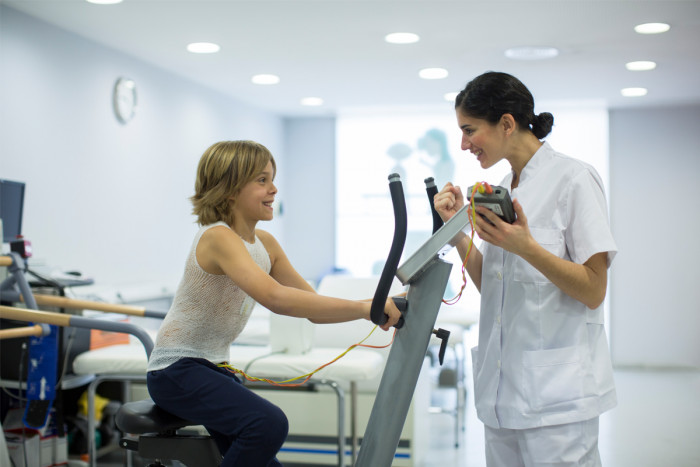Clinical Physiologist
Kaimātai Hinengaro Tiaki Tūroro
Alternative titles for this job
Clinical physiologists use technical equipment to measure and analyse patients' organs or internal systems, to help doctors diagnose and treat patients.
Pay
Qualified clinical physiologists usually earn
$59K-$86K per year
Senior clinical physiologists usually earn
$88K-$119K per year
Source: APEX and Te Whatu Ora, 2022 - 2024
Job opportunities
Pay
Pay for clinical physiologists varies depending on skills, experience and the type of work they do.
Clinical physiologists working for Te Whatu Ora Health NZ (cardiac, respiratory, sleep and renal)
- Qualified clinical physiologists usually earn $59,000 to $86,000 a year.
- Senior clinical physiologists, who may also supervise staff, can earn $88,000 to $119,000.
Sources: Te Whatu Ora, 'APEX and Te Whatu Ora Health New Zealand Clinical Physiology Collective Agreement 20 October 2022- 31 May 2024'.
- Te Whatu Ora website - 'Te Whatu Ora Health New Zealand Clinical Physiology Collective Agreement 20 October 2022- 31 May 2024' (PDF - 18.1 MB)
- PAYE.net.nz website – use this calculator to convert pay and salary information
(This information is a guide only. Find out more about the sources of our pay information)
What you will do
Clinical physiologists may do some or all of the following:
- operate specialised equipment to monitor and record activity and functioning of the heart or other organs
- monitor patients during exercise or sleep tests to check for disease or disorders
- test and monitor patients' lung function
- perform dialysis to treat patients with kidney failure
- interpret patients' test results, and write reports to help general practitioners or physicians decide on treatment
- take part in research projects.
Skills and knowledge
Clinical physiologists need to have:
- knowledge of the structure and function of the human body or specific organs
- knowledge of diseases that affect specific organs
- understanding of how organ monitoring equipment works
- technical skills to operate complex medical equipment.
Working conditions
Clinical physiologists:
- usually work regular business hours, but may also work overnight or weekends, or be on call
- work in hospitals and clinics.
What's the job really like?

Laura Young
Respiratory Physiologist
From exercise to respiratory physiology
Respiratory physiologist Laura Young learned the foundations of physiology and how to use exercise physiology in clinical practice while studying for her undergraduate and master’s degrees.
After she graduated, a job came up as a respiratory physiologist at an Auckland clinic, which utilised her exercise physiology qualifications and allowed her to develop her skills and knowledge in another area.
“As a respiratory physiologist, having a background in exercise physiology is useful. I work on research projects where I get to make use of my exercise physiologist skills and knowledge. There is some overlap between respiratory, sleep and exercise physiology so our knowledge base is quite transferable."
What does the job involve?
“We perform a variety of tests which assess all aspects of lung function, including maximum exercise tolerance, for a wide range of respiratory symptoms. We also see a large variety of patients. Some people come in with asthma-like symptoms and others have had lung transplants.
"Each day we receive referrals from doctors and it is our job as physiologists to decide which lung function tests are required, perform those tests, and send the results back to the doctors."
What advice would you give to future physiologists?
"Never stop learning, take every opportunity that comes your way, and always remember that each time you see a patient you have an opportunity to make their journey through the health system a little bit more positive.”
Entry requirements
To become a clinical physiologist you usually need to:
- complete a Bachelor of Science degree with a relevant major, or equivalent such as a sport and exercise science degree
- complete a Medical Technology Certificate or a Postgraduate Certificate in Medical Technology
- complete a relevant postgraduate qualification, such as a Postgraduate Diploma in Medical Technology.
- University of Otago website - Postgraduate Certificate in Medical Technology
- University of Otago website - Postgraduate Diploma in Medical Technology
- Society of Cardiopulmonary Technology website - Certification of Cardiac Physiologists (CCP)
The Vulnerable Children Act 2014 means that if you have certain serious convictions, you can’t be employed in a role where you are responsible for, or work alone with, children.
You also need to be registered with the Clinical Physiologists Registration Board.
Secondary education
NCEA Level 3 is required to enter tertiary training. Useful subjects include biology, physics, health, chemistry and mathematics.
Personal requirements
Clinical physiologists need to be:
- responsible and reliable
- focused and accurate
- able to remain calm in emergencies and to work well under pressure
- able to work well as part of a team
- good communicators
- good at keeping records.
Useful experience
Useful experience for cardiac physiologists includes:
- other medical technician or hospital-based work
- experience dealing with the public
- working with technology.
Registration
Clinical physiologists need to be registered with the Clinical Physiologists Registration Board.
Clinical Physiologists Registration Board website – registration
Find out more about training
- Clinical Physiologists Registration Board
- www.cprb.org.nz
What are the chances of getting a job?
Demand strong for clinical physiologists
Demand for clinical physiologists is strong due to:
- increasing demand for physiology treatment, especially with the growing elderly population
- not enough people training for the role.
Medical technician appears on Immigration New Zealand's regional skills shortage list. This means the Government is actively encouraging skilled medical technicians from overseas to work in New Zealand.
Clinical physiologists (sleep, renal, exercise, respiratory, neurology, and cardiac) appear on Immigration New Zealand's Green List. This means the Government is actively encouraging skilled workers in those roles from overseas to work in New Zealand.
According to the Clinical Physiologists Registration Board, there were 272 cardiac physiologists, 77 renal physiologists, 51 exercise physiologists, 43 respiratory physiologists, 31 sleep physiologists and 24 neurophysiology technicians registered in 2019.
Most clinical physiologists work in hospitals
Most clinical physiologists are employed by public hospitals. Some also work for private hospitals or health clinics.
Sources
- APEX and District Health Boards, 'Clinical Physiology National Collective Agreement', 9 March 2020, (www.bopdhb.govt.nz).
- APEX, 'What Do Clinical Physiologists Do?', accessed August 2020, (www.apex.org.nz).
- Clinical Physiologists Registration Board, '2019 Annual Report', accessed August 2020, (www.cprb.org.nz).
- Clinical Physiologists Registration Board website, accessed August 2020, (www.cprb.org.nz).
- Immigration New Zealand, Green List, April 2023, (www.immigration.govt.nz).
- Society of Cardiopulmonary Technology website, accessed August 2020, (www.sct.org.nz).
- Youard, J, registrar, Clinical Physiologists Registration Board, careers.govt.nz interview, August 2020.
(This information is a guide only. Find out more about the sources of our job opportunities information)
Progression and specialisations
Clinical physiologists may progress to more senior roles or managerial positions.
Clinical physiologists can specialise in a number of roles, including:
- Cardiac Physiologist
- Cardiac physiologists use technical equipment to monitor, record, measure and analyse the way patients' hearts are working to help doctors diagnose and treat patients with heart disease.
- Respiratory Physiologist
- Respiratory physiologists test the way patients are breathing to help treat lung disease or disorders such as asthma. They may be involved in exercise tests or sleep studies.
- Renal Physiologist (Dialysis)
- Renal physiologists help to treat patients with renal or kidney failure.
- Sleep Physiologist
- Sleep physiologists work with patients who have health issues relating to poor sleep quality. They treat conditions such as sleep apnoea.
- Neurophysiology Technologist
- Neurophysiology technologists record brain and nerve activity using specialised equipment. They may also be involved in sleep studies.
- Exercise Physiologist
- Exercise physiologists analyse patients' fitness to help them improve or maintain good health. They also help to treat other chronic health diseases, such as heart disease.
Last updated 16 October 2023


